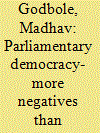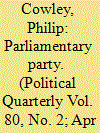| Srl | Item |
| 1 |
ID:
117123


|
|
|
| 2 |
ID:
092367


|
|
|
|
|
| Publication |
2009.
|
| Summary/Abstract |
The Conservative parliamentary party will fulfill three important functions for any incoming Conservative government: it will be the focus of attention for the national media; it will be the bulk vote that will deliver its legislative programme; it will form the talent pool from which members of any incoming government will be recruited. A majority Conservative government could see a majority of its MPs newly elected, with more Conservative women and ethnic minority MPs than ever before (although there will be little change in the socio-economic background of their MPs). These new MPs will present problems in terms of party management, although they will be less likely to rebel than longer-serving MPs. There are also relatively few signs of discontent among incumbent Conservative MPs (the article identifies the most rebellious Conservative MPs). Any new Conservative government will also have to deal with a reformed House of Lords, in which it will no longer have a majority.
|
|
|
|
|
|
|
|
|
|
|
|
|
|
|
|
| 3 |
ID:
157775


|
|
|
|
|
| Summary/Abstract |
Building on the theoretical proposition that congruence is as much a property to be measured in authoritarian regimes as it is in democratic regimes, the aim of this article is to understand the phenomenon of ideological and political congruence in Angola. To carry out this analysis, we rely on two original surveys, conducted in 2012 with members of parliament (MPs) and college students (voters), covering equivalent policy issues. The results, to some extent exploratory, suggest moderate levels of congruence between MPs and voters. This article contributes to the existing scholarship through a case study that escapes a golden rule in this field – i.e., it is not a democracy. Moreover, it features congruence as a potentially relevant factor in understanding dominant parties’ persistence in authoritarian settings.
|
|
|
|
|
|
|
|
|
|
|
|
|
|
|
|